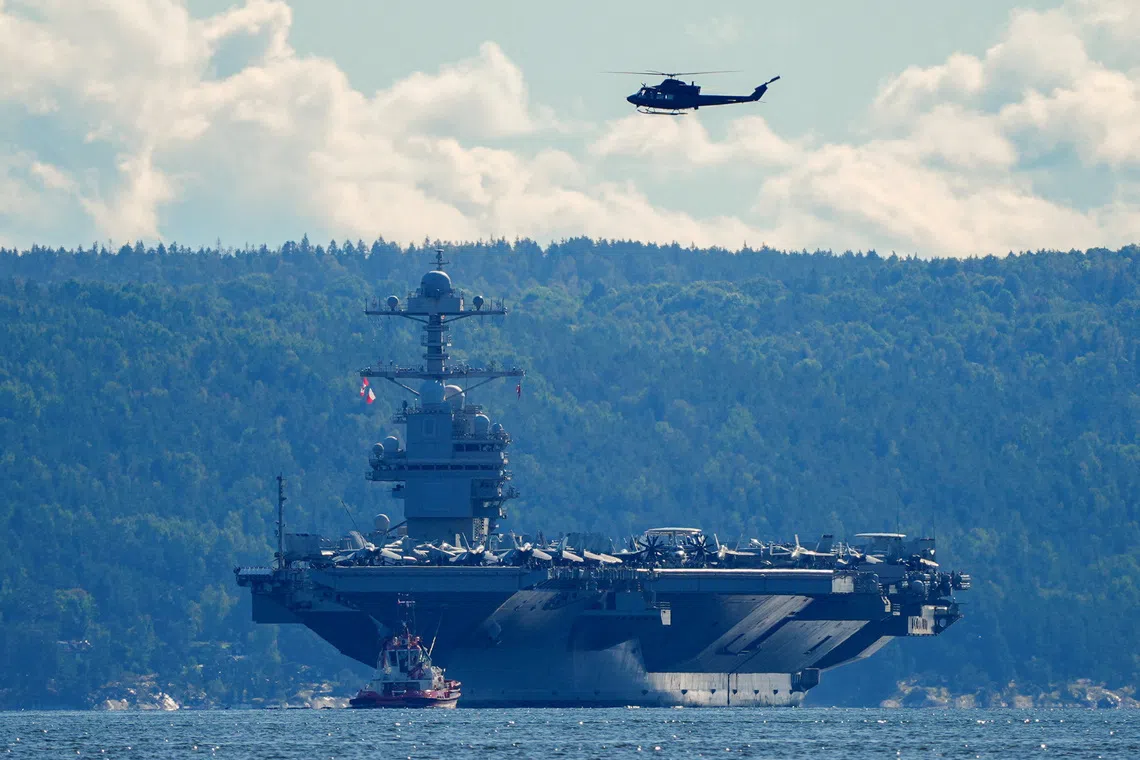Venezuela claims CIA ‘false flag’ attack foiled, as US deploys bombers
Sign up now: Get ST's newsletters delivered to your inbox

The Pentagon has so far deployed seven warships to the Caribbean and one to the Gulf of Mexico.
PHOTO: REUTERS
CARACUS – Venezuela claimed on Oct 27 to have dismantled a Central Intelligence Agency-financed cell plotting a false-flag attack on a US warship deployed to the southern Caribbean, as Washington stepped up pressure on Caracas by flying bombers nearby.
The Venezuelan authorities said they uncovered an operation targeting the USS Gravely, a guided-missile destroyer that docked on Oct 26 in Trinidad and Tobago – within firing distance of the Venezuelan mainland.
The ship’s arrival sparked outrage in Caracas, which called it a “provocation” and claimed it was “aimed at provoking a war in the Caribbean”.
It also deepened tensions with Trinidad and Tobago, whose Prime Minister Kamla Persad-Bissessar is a strong critic of Venezuelan President Nicolas Maduro, and a supporter of US President Donald Trump’s military campaign against drug traffickers in the Caribbean.
Mr Maduro on Oct 27 evening announced he had suspended a gas agreement with Trinidad and Tobago, accusing Ms Persad-Bissessar of transforming her nation “into an aircraft carrier of the American empire against Venezuela”.
As part of Mr Trump’s campaign, the Pentagon has so far deployed seven warships to the Caribbean and one to the Gulf of Mexico.
The United States has also announced the imminent arrival of the USS Gerald R. Ford, the world’s largest aircraft carrier, and its accompanying fleet.
Venezuela and some observers believe Mr Trump’s administration is using the military deployments to build pressure on the government and depose Mr Maduro, whom Washington does not recognise as the legitimate president.
Venezuelan Interior Minister Diosdado Cabello said on Oct 27 that a cell “financed by the CIA” planned to attack the USS Gravely and frame Caracas.
Four people were arrested, Mr Cabello said, without providing details of the alleged suspects. Venezuela regularly claims to have arrested US-backed mercenaries working to destabilise Mr Maduro’s administration.
Alongside his naval build-up, Mr Trump recently confirmed authorising CIA operations in Venezuela and considering ground strikes.
Since September, US forces have destroyed at least 10 boats they said carried narcotics
Experts question the legality of the deadly attacks, and Washington has offered no proof other than aerial videos of the strikes to link the vessels to trafficking.
Bombers
Tensions rose further on Oct 27 as two US B-1B bombers flew over the Caribbean near Venezuela, the third such show of force in recent weeks.
Data from tracking website Flightradar24 showed the two bombers – which took off from a base in the northern US state of North Dakota – flying parallel to the Venezuelan coast before disappearing from view.
Earlier missions included a B-1B sortie last week and a B-52 flight earlier in October, signalling Washington’s readiness to escalate pressure on Mr Maduro’s government.
Washington and Caracas have for years been at loggerheads, with the United States rejecting Mr Maduro’s election victories in 2018 and 2024 as fraudulent.
Venezuelan Vice-President Delcy Rodriguez had urged earlier on Oct 27 for the suspension of gas deals with Trinidad, to raise the cost of the crisis for the United States and its ally.
Ms Persad-Bissessar rejected what she called Venezuelan “blackmail”, telling AFP her country remains committed to security and energy cooperation.
Washington recently cleared Trinidad and Tobago to exploit the Dragon gas field in Venezuelan waters despite a US oil embargo, deepening friction between the neighbours.
Mr Maduro, who denies US allegations he leads a drug-trafficking network, has accused Washington of “fabricating a war” for political purposes. AFP


